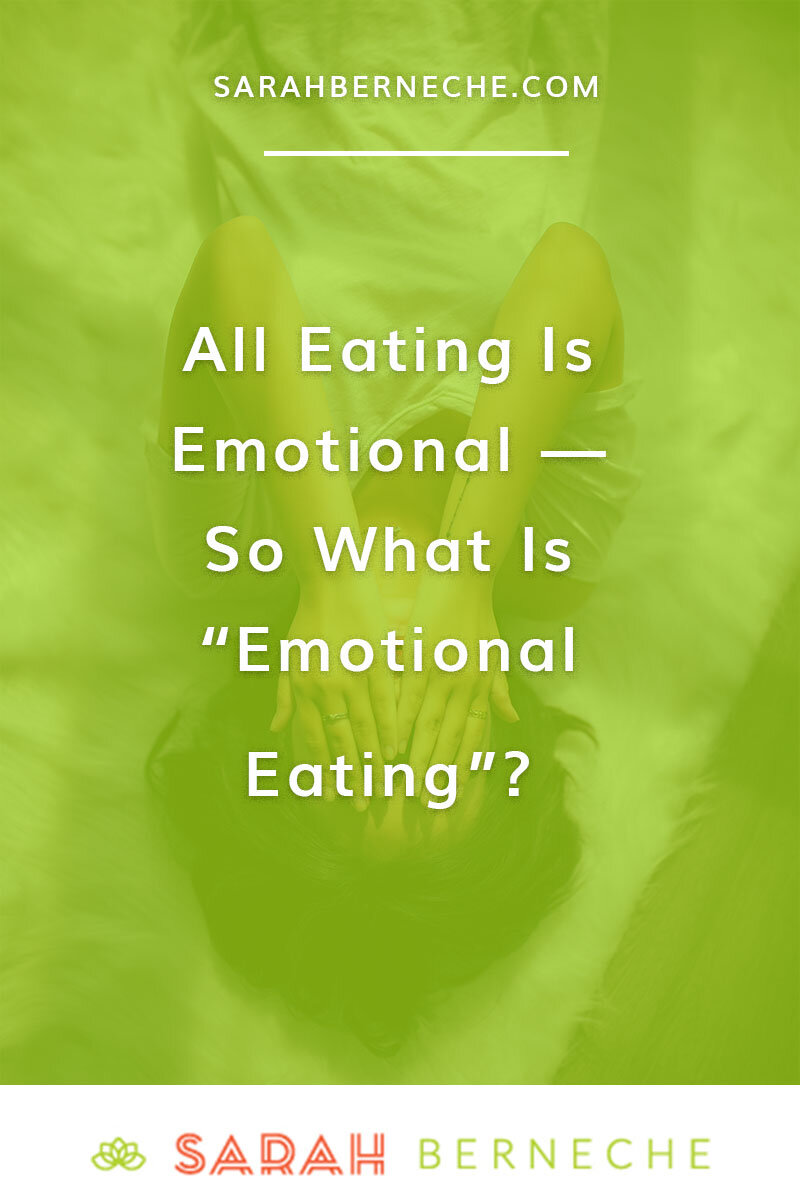How do you define emotional eating? If you’re like most people I know, you might think emotional eating is…
…Grieving a break-up over a pint of cookie dough ice cream
…Ordering pizza on a Friday night
…Eating beyond fullness
…Eating foods that are not “healthy.”
I have other thoughts.
Eating is always emotional.
I’m of the mind that eating is inherently emotional, always emotional, because our reasons for eating are always emotionally driven. Whether we’re bored, fearful, upset, tired, excited, or who knows the double-h-e-hockey sticks what, we’re probably experiencing something along with that plate of fries or chicken sandwich.
One of my favourite food writers, M. F. K. Fisher, touched on this decades ago: It seems to me that our three basic needs, for food and security and love, are so mixed and mingled and entwined that we cannot straightly think of one without the others. So it happens that when I write of hunger, I am really writing about love and the hunger for it, and warmth and the love of it and the hunger for it…and then the warmth and richness and fine reality of hunger satisfied…and it is all one. During these trying and isolating times, food (hopefully) shows up for us, as reliable, perhaps, as a long-standing friend. And if you struggle to see food through the lens of safety, know that I see you out there.
We’re biologically wired to get pleasure from food, so it makes sense that we find food pleasurable. If we didn’t enjoy food, we might not eat, which doesn’t exactly bode well for the human species.
The importance of legalizing food
At the same time, I think there’s a difference between feeling an emotion while eating and taking our feelings out on (or suppressing them) through food. And while, at its core, emotional eating — taking our feelings out on food — is a pretty benign coping mechanism, and something I encourage you to legalize fully and entirely for your own sanity and overall health, I also understand there are times when emotional eating doesn’t feel good. While I believe emotional overeating or under-eating is more concerning from a nutrition standpoint than self-soothing through eating, I know firsthand that it doesn’t always feel that way.
Times when it doesn’t feel supportive.
Times when it doesn’t feel like a choice.
Times when it leaves you feeling worse, not better.
Times when it’s just not a match for how you’re feeling inside.
Yes, there’s a difference between ordering take-out on a Saturday because it sounds like a fun thing to do, and feeling like take-out is your only method for feeling better. And while it can be so helpful in the moment to have food available—even intuitive eaters eat emotionally sometimes!—it can’t help us truly process our deeper feelings. That said, most nutrition programs I’ve seen position the “solution” as a restrictive diet or set of food rules, chalk emotional eating up to “food addiction” and hyper-palatable foods, and otherwise endorse “flexible” dieting measures (or the other side of the emotional eating coin) as the way to “conquer” unsupportive eating behaviours.
Not only does this keep you stuck cycling between dieting and out-of-control eating for months, years, and decades, but it also doesn’t allow for thorough healing (if that is what is sought). By shining a light on the functions of both emotional eating and emotional under-eating (dieting), we can help folx eat normally and cope with their emotions in feel-good ways — both with food and without.
Emotional eating has nothing to do with the food itself
I suspect a large piece of why emotional eating is so often misunderstood (and poorly treated/supported) has to do with the label. What we think of as an emotional eating problem is better defined as a self-soothing difficulty, since it has nothing to do with the food itself — I could “emotionally eat” a pizza one day and eat a whole pizza the next out of sheer hunger — and everything to do with the ways we’re managing our feelings in life.
Emotional eating is not “good” or “bad,” but relatively benign, useful, helpful, necessary, and relevant. For some of us, the fact that food has been there for us has allowed us to get through life.
And like other coping strategies — weighted blankets, walks along the beach, meditation, journaling, bubble baths, talking with friends — it’s not necessarily going to work, or be what we need, every single time. Sometimes what we really want in our heart of hearts is to eat a pizza on a Friday night while watching a movie. And sometimes we might need something different.
healing emotional eating
The only person who gets to decide whether the way you’re coping is supportive or unsupportive is you. Even if they think what you’re doing with your food is “wrong” or “bad,” it doesn’t mean it’s “wrong” or “bad” for you. What do you like or not like about your behaviours? What are the behaviours taking care of? Do you want to change these behaviours, or do you feel like you should?
The process of healing our eating difficulties doesn’t begin with more rules and restrictions around eating, but with a slow dance with my three favourite partners — compassion, curiosity, and connection. A gentle turning inward to discover what our feelings and needs are in all of their glory, so that we can best meet them with the resources we have available.

[…] helpful to look at your food and eating patterns. Are there certain food groups that provoke a deeper reaction from you than others? Do you feel […]
[…] As an intuitive eating counsellor and nutritionist — someone who helps women all over the world to stop bingeing, make peace with food, and feel at ease in whatever body they happen to find themselves in — one of the chief concerns I encounter involves “overeating.” […]